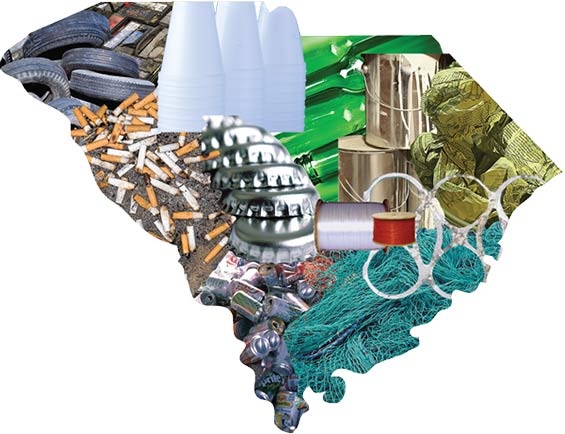How Long Does It Take - State of Decomposition
Have you ever wondered how long a piece of trash lasts?
Ever wonder if it's harmful to you, the environment or wildlife?
What if it was just left there? What if no one cared enough to remove it? How long would it stay there?

![]() indicates that the items below are recycleable.
indicates that the items below are recycleable.
| Item | Time to Decompose |
|---|---|
| Aluminum Made from bauxite; its mining and processing is a major source of water pollution | 200+ years |
| BatteriesToxic materials are released into the soil and waterways as batteries break down slowly. Recent technology developments have allowed single use batteries to be recycled in a cost effective manner. | 100 years |
| Cigarette ButtsReleases deadly chemicals that accumulate in the the soil and waterways, passing up into the food chain of our wildlife. | 5 years |
| Fishing Net (nylon)Discarded fishing nets can cause our wildlife to become entangled, limiting movement, and causing death in many cases. Nylon can be reused, but not fully recycled. | 40 years |
| GlassBroken and discarded glass can cause deep cuts and injure us and wildlife. Glass bottles and jars are 100% recyleable; make sure you dispose of them porperly! | 1-2 million years |
| Monofilament (fishing line)Although there are alternatives to partially recover and reuse monofilament fishing line, the process is not widely used. As it accumulates in the environment, discarded fishing line entangles and traps our South Carolina wildlife. | 600 years |
| Paper | 6 weeks |
| Six Pack Rings & Plastic Bags Traps, suffocates, disfigures, and causes death for land and marine animals. These materials often are light enough to float in water, and can be seen as food sources (a floating plastic bag looks like a jellyfish to a hungry sea turtle) to some animals. | 450 years |
| StyrofoamCreated from a number of dangerous chemicals including benzene (a type of carcinogen) and styrene. Because it takes so long to break down, Styrofoam effectively will never decompose. | Never |
| TiresContain oils that contaminate the soil; they also consist of heavy metals such as lead, that can persist in the environment and accumulate over time. | 2000 years |
Did You Know?
Recycling, reusing, and remanufacturing accounts for 3.1 million jobs in the U.S. - that's roughly one out of every three green jobs!
States with deposits on bottles and cans receycle 75-95% of all cans sold. States without deposits only recycle 35% of cans sold. This can potentially threaten both tourism and recreation, taking critical dollars which add to local economies.
You Can Help!
Recycle more every day
Reject plastic - use reusable bags at the grocery store
Dispose responsibly
